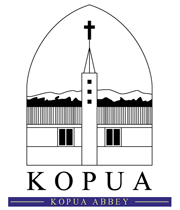St Benedict urges all monks to Prefer nothing to Christ and that summarises Cistercian monastic life rather well.
Our lives are guided by the Rule and the leadership of our abbot and our monastery is understood to be a School of the Lord’s Service where Christ is formed in
our hearts through prayer, our abbot’s teaching and our fraternal way of life. Through God’s word we are trained in a discipline of heart and action, to be responsive to the Holy Spirit and so attain purity of heart and a continual mindfulness of God’s presence. We strive to live a life which holds a number of elements in tension: life in community and a life of solitude; prayer both communal and personal; reverence for the Scriptures, and a simple, even austere lifestyle supported by the work of our own hands. Care of pilgrims and concern for the poor is a priority for us.
The Cistercian Grace can be expressed this way: We seek God within a community that endeavours to be a School of Charity – a place where we learn to embrace our God, our community and all pilgrims and, as well, to cherish the place and the environment in which we live. Love is the fuel that impels them forward.
We are called to be single-minded in our search for God, attentive to the presence of God within ourselves, our community and those whom we meet.
Celibacy is part of this search. So are regular times for prayer and meditation. We live according to a daily rhythm by which we hope to grow in mindfulness of God’s presence. Seven times a day we gather to pray. The day begins at 4.00am. In the night hours, we wait for the dawn, as a symbol of the coming of the Light of Christ into the world. Throughout the day, following the rising and the setting of the sun, we continue to chant the praises of God. At 8.00pm our day concludes with night prayer. Early rising means early retiring! By entering into this rhythm we develop a deep attentiveness of spirit, learning to listen at a profound level, and consequently experience and perceive God, others, ourselves and all creation in a new way. Cistercian lifestyle becomes a real adventure of the spirit, and it assumes the quality of an interior journey of the heart.
All of us are assigned responsibilities, according to our capacities, that help sustain our life. Newcomers are given more time for study and reflection so that they can be integrated into the life in an intelligent manner.
Manual work provides a balance to the more reflective side of our life. It is also a way in which we share in the lot of everybody else who must work in order to eat!
Because a monastic community is a stable one many people find it attractive – Christian or otherwise. Hospitality is an essential value for us. We welcome people to share our journey for a time in the search for inner peace and meaning. At Kopua, we have a guest house and a hermitage. These facilities provide space where visitors can reflect on their lives and on any direction they might need to take. Guests of the monastery are welcome to join us in our prayer if they so wish.
Because our lifestyle is different from that which is normally encountered in society, our presence can provide a challenge to those who meet us.
By providing this challenge, not so much by our words but through our way of life, we demonstrate that we are people who essentially live for others. Our concern is not so much “to do” things for others, but “to be” for others – a living reminder that, at the core of our being, we are Questions seeking an Answer. Through our hospitality, we share with others something of our way towards finding that Answer.
All this may sound very elevated and it is! But there are two attributes that we strive to cultivate – a healthy sense of our own fragility and an equally healthy sense of humour. Both are at the service of each other and both provide an antidote to the danger of taking ourselves too seriously.
The elder was asked, “How is it that some say, ‘We see visions of angels’?” The elder replied, “Happy are those who always see their sins.” (Desert Fathers)

